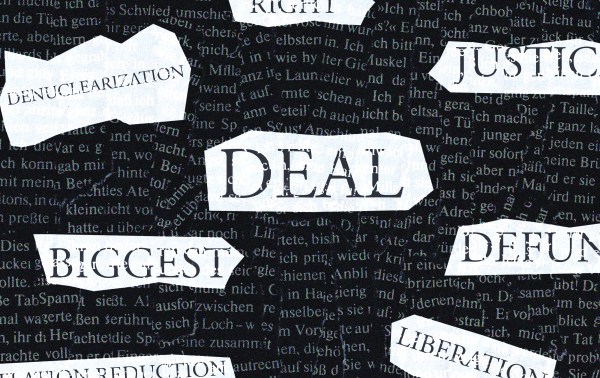Happy Monday! Are you a journalist or aspiring journalist who likes what we’re doing and wants to join the team? Apply for our fall internship! We don’t bite, and hopefully you don’t either.
Quick Hits: Today’s Top Stories
- Hamas released footage on Friday of Israeli hostage Evyatar David, who was abducted from the Nova music festival on October 7, 2023, and has been held in Gaza for more than 660 days. In the terrorist propaganda video, a visibly pale and emaciated David dug a grave that he said could be his own in an underground tunnel, warning that “time is running out.” David’s family, who on Saturday approved the video for publication, described his condition as “a living skeleton buried alive,” calling for an immediate hostage release deal. The clip came a day after Palestinian Islamic Jihad released footage of another Nova festival abductee, Rom Braslavski, who said he was unable to walk or stand in his emaciated state. The terror group said the video was recorded days before they lost contact with Braslavski’s captors, and claimed they do not know of his current state or whereabouts. The recordings prompted protesters in Tel Aviv to take to the streets Sunday morning—some blocking the city’s primary freeway, the Ayalon Highway—to call for an immediate deal to free the remaining 50 hostages held captive in Gaza.
- A Russian aerial assault on Kyiv late last week killed 31 civilians and injured 159 others, according to Ukrainian officials, who described the attack as the single-most deadly on the country’s capital in a year. A Russian strike on a civilian apartment block was responsible for 28 of the deaths, including five children. “This is the highest number of injured children in one night in Kyiv since the beginning of the full-scale invasion,” Kyiv Mayor Vitali Klitschko said. Meanwhile, President Donald Trump said on Friday he was repositioning two U.S. nuclear submarines to “appropriate regions” in response to comments by former Russian President Dmitry Medvedev. In a post on X, the ally of Russian President Vladimir Putin had written that “each new ultimatum is a threat and a step towards war,” following Trump’s deadlines for Moscow to reach a peace agreement with Ukraine.
- El Salvador’s Legislative Assembly passed a series of constitutional amendments on Friday, including one ending presidential term limits and allowing current President Nayib Bukele—whose political party and its allies hold a legislative supermajority—to seek a prospective third term. The nation’s legislature also extended the president’s term from five to six years and eliminated a second-round runoff election held between the top two finishers, which will make the candidate with the most votes the declared winner. Bukele, first elected in 2019 and reelected in 2024, has—while in office—described himself as “the coolest dictator in the world.”
- The U.S. economy added 73,000 nonfarm jobs in July, the Bureau of Labor Statistics (BLS) reported Friday—below the Dow Jones estimate of 100,000—and also revised down estimated job gains in June and May. While the BLS had initially projected that 147,000 jobs were added in June and 144,000 in May, those estimates on Friday were reduced to 14,000 and 19,000, respectively. Meanwhile, the unemployment rate ticked up to 4.2 percent, up from 4.1 percent in June. In response to the BLS report, Trump on Friday fired the agency’s director, Erika McEntarfer, claiming on Truth Social, without evidence, that she “faked the Jobs Numbers before the [2024] Election” in former Vice President Kamala Harris’ favor. “She will be replaced with someone much more competent and qualified,” he added.
- The Federal Reserve announced Friday that Adriana Kugler, one of the seven members of the central bank’s board of governors, will resign from her position on August 8 to return to her teaching position at Georgetown University. Former President Joe Biden appointed Kugler in September 2023, and her term was not set to expire until January 2026. Responding to the news on social media, Trump—who has been pushing the central bank to lower interest rates and will now get to nominate a replacement—again pushed for Federal Reserve Chairman Jerome Powell to resign. “She knew he was doing the wrong thing on Interest Rates,” the president wrote. “He should resign, also!”
- The Corporation for Public Broadcasting (CPB), a nonprofit organization formed in 1967 and funded through Congress, announced Friday that it would begin “an orderly wind-down” of operations after Congress passed a recissions package last month that eliminated the nonprofit’s federal funding. In a statement, the corporation said the “majority” of CPB employees will depart on September 30, while a “small transition team” will remain through January 2026. NPR and PBS, which the CPB has helped fund, said they would continue to operate and praised the nonprofit group for its support throughout the years.
- In response to a congressional redistricting proposal that Texas GOP state legislators introduced on Wednesday, many state House Democratic lawmakers announced plans on Sunday to flee the state, thereby breaking quorum—the Texas House requires two-thirds of seated members to be present to hold a vote—and temporarily blocking the bill’s advancement. Most traveled to Illinois, while others traveled to New York and Massachusetts. This tactic was most recently used in 2021, when Texas House Democrats departed Texas for Washington, D.C., to prevent a GOP-led voting reform bill from passing. The bill ultimately passed five weeks later, after three Democrats returned to the state legislature.
From our friends at The Observer
Smart coverage of power and ideas.
Check out The Observer Daily for the very best of their investigations, interviews, reviews, and reporting—curated daily by the newsroom’s editors. Sign up for free.
Israel Under Pressure

Anti-Israel protests broke out in cities across the world over the weekend, from New York City to Edinburgh to Sydney, where WikiLeaks founder Julian Assange joined an estimated 100,000 demonstrators to march across the famous harbor bridge on Sunday. “Shame, shame Israel, shame, shame USA,” the group chanted. “What do we want? Ceasefire. When do we want it? Now.”
The unrest comes amid a global surge in anti-Israel animus over the growing humanitarian crisis in Gaza, raising the specter of international isolation at the same time that domestic pressure to end the war builds. Rather than see its adversary’s moment of heightened weakness as an opportunity to make a deal, however, Hamas may leverage the international outrage and double down. As the war—and consequently, the suffering of the Gazan people—continues, the terrorist group likely believes it can squeeze new concessions from Israel, particularly with the prospect of Palestinian statehood back on the table.
Meanwhile, Hamas is once again playing on a major pressure point for Israelis: the remaining 50 hostages in Gaza, about 20 of whom Israel believes are alive. On Friday, the group released a propaganda video of Evyatar David, a 24-year-old hostage taken from the Nova music festival on October 7, 2023. The footage, filmed in what appears to be one of Hamas’ underground tunnels, shows a deeply emaciated David being forced to dig a grave that he says could be his own. “This is the grave I think I’m going to be buried in,” he said in the recording. “Time is running out. You are the only ones who can end this.”
As a non-paying reader, you are receiving a truncated version of The Morning Dispatch. You can read our full item in the members-only version of TMD.
The video came a day after Palestinian Islamic Jihad, a Hamas-aligned terrorist group, published footage of hostage Rom Braslavski. Also visibly starved, Braslavski said he is no longer able to walk or stand. “I don’t have any more food, or water, before they would give me a little bit, today there is nothing,” he said. “I am at death’s door, and I’m sure that all the other [hostages] are in the same mental state.” PIJ claims to have lost contact with Braslavski’s captors after the video was filmed.
Tens of thousands of protesters convened in Tel Aviv on Saturday for weekly demonstrations calling for an end to the conflict and the release of hostages. Among the demonstrators were family members of David, including his brother Ilay, who in a speech accused Hamas of “using Evyatar in one of the most horrific and calculated campaigns of cruelty imaginable—a live hunger experiment,” adding that the terrorist captors were “starving him deliberately, systematically, using his agonizing suffering as a twisted tool for their depraved propaganda.”
The protests came amid a U.S.-led push for an “all or nothing” deal in Gaza. Such an agreement would, in theory, end the war permanently and bring all 50 hostages home at once, a move away from the phased releases of past temporary truces. “President Trump now believes that everybody ought to come home at once—no piecemeal deals. That doesn’t work,” White House special envoy Steve Witkoff told hostage families on Saturday, according to a report by Axios. Witkoff went on to add that Hamas must disarm as part of any future agreement.
For many Israelis, such an arrangement would be the ideal outcome. It would put an end to a 22-month war while also securing the release of hostages and ensuring that Gaza no longer poses an immediate threat to Israel. But Hamas on Saturday rejected Witkoff’s premise that it had “expressed its willingness” to lay down its arms, saying that it would not yield its “resistance and its weapons” unless a Palestinian state with Jerusalem as its capital is established. And the group may have a vested interest in continuing the war until that happens.
Late last month, French President Emmanuel Macron announced plans to recognize a Palestinian state before the United Nations General Assembly in September, a move that would add France to a list of more than 140 countries worldwide that formally recognize an independent Palestine. In a public letter to Palestinian Authority (PA) President Mahmoud Abbas, whose faction runs the West Bank, Macron called for an immediate ceasefire in Gaza, the release of Israeli hostages, and the delivery of more humanitarian aid to the Palestinian people.
British Prime Minister Keir Starmer followed suit last week, stating that the United Kingdom would support the creation of a Palestinian state unless Israel “takes substantive steps to end the appalling situation in Gaza, agree to a ceasefire, and commit to a long-term, sustainable peace.” Critics have argued that Starmer’s ultimatum gives Hamas every reason to negotiate in bad faith, if the end result of the war’s continuation is statehood. Still, Canada joined the other major Western powers in announcing plans to recognize a Palestinian state the next day, with Prime Minister Mark Carney calling on Abbas’ PA to commit to elections and other democratic reforms.
Both the Trump administration and Israeli Prime Minister Benjamin Netanyahu rejected the announcements, arguing that planned recognition of a state would reward terrorism. And indeed, Hamas has already begun to take credit for furthering the Palestinian cause. “The fruits of October 7 are what caused the entire world to open its eyes to the Palestinian issue—and they are moving toward it with force. That is, that the Palestinian people are a people who deserve a country,” Hamas Political Bureau Chief Ghazi Hamad said in an interview with Al Jazeera that aired Saturday. “Why are all the countries recognizing a Palestinian state today? Before October 7, did any country dare recognize a Palestinian state?”
And Hamas remains clear on what such a state should entail: the destruction of Israel. In the same interview, Hamad urged the people of Gaza to “be patient,” because “the gradual countdown to Israel’s collapse has begun.”
Meanwhile, Slovenia on Thursday became the first European country to block the purchase and sale of weapons to Israel, citing the humanitarian crisis in Gaza. “In such circumstances, it is the duty of every responsible state to act, even if this means taking a step ahead of others,” Prime Minister Robert Golob’s office said in a statement. The move was largely symbolic, however, as the country doesn’t currently have any arms deals with Israel.
Far more concerning, from Israel’s perspective, is the potential breakdown in its relationship with the United States. In a Gallup poll conducted between July 7 and 21, American support for Israel’s military action in Gaza fell to 32 percent—its lowest point since the conflict began in late 2023. U.S. backing for Israel falls sharply along partisan lines, with 71 percent of Republican respondents saying they approved of Israel’s military actions and just 8 percent of Democrats saying the same.
But there are some signs of cracking support for Israel even from within Trump’s base, particularly among very vocal, very online right-wing voices. The Nelk Boys, a group of Canadian and American Trump-friendly social media influencers, received a wave of backlash after hosting Netanyahu on their “Full Send” podcast last month, with the podcast’s YouTube channel losing more than 10,000 subscribers in a single day after the interview aired. Meanwhile, polarizing figures like Tucker Carlson and Rep. Marjorie Taylor Greene have used their large platforms to accuse Israel of committing war crimes, with Greene becoming the first Republican in Congress to accuse the Jewish state of genocide last week.
“My people are starting to hate Israel,” Trump recently told a Jewish donor, according to a report by Financial Times.
Israel’s international standing may continue to worsen as the war drags on, a reality of which Hamas is acutely aware as it continues to double down on maximalist demands in ceasefire negotiations. “Hamas didn’t agree to a truce even when international pressure was mounting against it in recent weeks,” Lazar Berman, a Jerusalem-based analyst and diplomatic correspondent, wrote in the Times of Israel. “It certainly won’t now as Israel takes more blows with each passing day.”
“And though the countries announcing plans to recognize a Palestinian state are convinced they are strengthening the Palestinian Authority, Hamas has a much better case to make now to the Palestinian street that, despite the costs, only violence against Israel can lead to progress on statehood, and ultimately Israel’s destruction,” he added. “Many could well treat the October 7 slaughter as Palestine’s independence day.”
Today’s Must-Read

A Reading From the Book of Schumer
Toeing the Company Line

Old Fictions, New Fictions


Organized Crime’s Newest Targets

The Wrong Way to Cover Trans Issues

Why We Schooled Our Kids at Home—and Why We Finally Sent Them Out

When a Camera Makes the Call

Legal Challenge to Trump’s Tariffs Nears the Supreme Court

The Monthly Mailbag With James Scimecca

Assessing Claims About the Demise of the IRS’s ‘Direct File’ Program

Artificial Reef Conservatism | Solo

The Gatekeepers Have Left the Building | Interview: Bernard Goldberg
Worth Your Time
- In Foreign Policy, Johannes Lichtman chronicled the CIA’s Cold War-era book-smuggling operation in Soviet-controlled territory. “In the late 1950s, CIA agent and Romanian émigré George Minden realized that a book smuggling program could have the potential to destabilize the Soviet regime and fuel the resistance in satellite states. But Minden, who disliked the superiority and didacticism of early agency efforts, wanted to move away from cultural imperialism to collaboration with dissidents. He was chosen to lead what would come to be known as the CIA book program. Over the coming decades, this ‘Marshall Plan for the Mind’ would smuggle nearly 10 million items, along with printing presses and materials, into the Eastern Bloc, importing banned works by writers including Czeslaw Milosz, Jospeh Brodsky, Alexander Solzhenitsyn, Albert Camus, Kurt Vonnegut, Hannah Arendt, Philip Roth, and Vaclav Havel,” Lichtman wrote. “The CIA wanted to promote art that championed freedom and individualism to fight communism, win hearts and minds, and counter the Soviet-promoted idea that, as historian Lucie Levine put it, ‘the United States was a “culturally barren” capitalist wasteland.’ Art supported by the CIA would go a long way in showing the world that the United States was actually a culturally rich capitalist wasteland.”
- Should Coca-Cola replace corn syrup with cane sugar? As Jack Buter explained in National Review, government policy has long influenced the soft drink manufacturer’s answer to that question: “Last month, Donald Trump said that he had been speaking with Coca-Cola ‘about using REAL Cane Sugar in Coke in the United States, and they have agreed to do so.’ Secretary of Health and Human Services Robert F. Kennedy Jr., who has been campaigning to get food and beverage companies to drop artificial ingredients from their products, counted it as another win for the Make America Healthy Again movement when Coca-Cola announced that it would begin selling Coke with cane sugar this fall, in addition to its high-fructose-corn-syrup variety.” As Butler notes, though, cane sugar was at one time a central ingredient in soda beverages: “Before 1984, Coca-Cola did use cane sugar in its products. Protectionist programs motivated its move to other sweeteners, like corn syrup. It is official U.S. policy to subsidize the price of sugar by restricting both the amount imported and the amount produced domestically. The Big Beautiful Bill kept this in place. This policy has been successful, by its bizarre metric: Americans pay twice as much for sugar as does the rest of the world. High-fructose corn syrup (HFCS), a byproduct of heavily subsidized corn, becomes attractive by comparison.”
Presented Without Comment
Reuters: UN Report Finds United Nations Reports Are Not Widely Read
Also Presented Without Comment
Politico: Former Trump Statistics Chief Slams Friday Firing of Erika McEntarfer
Bill Beach, who Trump tapped for the top job at BLS in 2017, said Sunday that the president’s suggestions that McEntarfer had rigged the jobs report betrayed a misunderstanding in the data collection and reporting standards at the bureau, which compiles statistics on critical economic factors including inflation and employment.
“There’s no way for that to happen,” Beach told CNN’s Kasie Hunt on “State of the Union.” “The commissioner doesn’t do anything to collect the numbers. The commissioner doesn’t see the numbers for until Wednesday before they’re published. By the time the commissioner sees the numbers, they’re all prepared.”
Also Also Presented Without Comment
Reuters: UK Ninja Sword Ban Begins As 1,000 Weapons Surrendered In Knife Crime Crackdown
In the Zeitgeist
When the Philadelphia Phillies acquired relief pitcher Jhoan Duran—the “Durantula”—from the Minnesota Twins before last week’s trade deadline, they didn’t just get one of the hardest-throwing pitchers in baseball this year—they got one of the most electric personalized entrances in sports. It took the Twins more than 500 hours to engineer, and features a remix song customized for Duran by a Minnesota DJ and an animated tarantula engulfed in flames crawling across ballpark jumbo-screens.
On Friday, Philadelphia’s graphic design team was working to recreate the sequence, even using their own DJs to attempt to recreate Duran’s entrance song. Then, just in time for that night’s game, Minnesota’s team passed along the digital package:
Let Us Know
If Hamas is interpreting international recognition of a Palestinian state as a reward for its violence, how should democratic nations pursue peace without empowering terrorism?









Please note that we at The Dispatch hold ourselves, our work, and our commenters to a higher standard than other places on the internet. We welcome comments that foster genuine debate or discussion—including comments critical of us or our work—but responses that include ad hominem attacks on fellow Dispatch members or are intended to stoke fear and anger may be moderated.
With your membership, you only have the ability to comment on The Morning Dispatch articles. Consider upgrading to join the conversation everywhere.